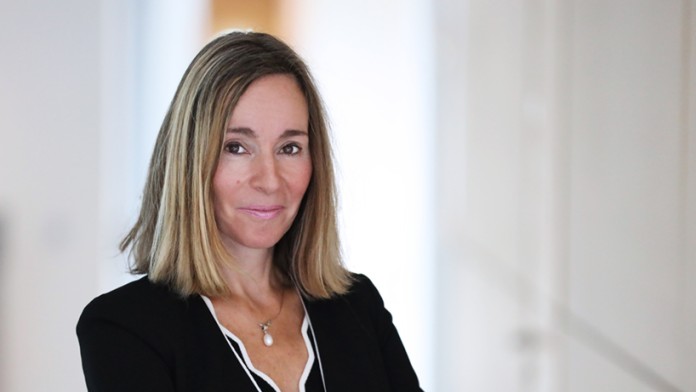Press Release from 2024-05-02 / Group, DEG, KfW Development Bank
Development cooperation remains a key priority for KfW as a bank committed to responsibility
- Christiane Laibach: “Development cooperation is in the strategic interest of Germany and Europe”
- In 2023, worldwide commitments of around EUR 11 billion supported German foreign policy and security policy
- KfW Development Bank: Less than 50 % of the funds come from the state budget (2023: around EUR 5 billion), DEG: EUR 1.9 billion from own funds
- Grants remain of great importance for fragile states, poverty alleviation and biodiversity conservation
- Transparent project evaluation for around 25 years – over 80 % successful
“Development cooperation is more relevant than ever because it has a highly relevant geopolitical dimension. It is an important instrument for supporting German foreign policy and security policy.”
This was what Christiane Laibach, Member of the Executive Board of KfW Group, said on Thursday in Frankfurt am Main, Germany.
“Development cooperation will continue to be a key priority area of our work as a bank committed to responsibility. The commitments made in 2023 amounting to EUR 11 billion are well invested.”
Global challenges such as climate change, natural disasters, migration flows and disrupted trade routes and supply chains can only be addressed at the international level.
“Developing countries and emerging economies as well as fragile countries must be part of the solution,”
said Laibach. This is why KfW is working with them on behalf of the German Federal Government and has been developing partnerships for many years.
Grants remain very important for supporting fragile states, alleviating poverty and conserving biodiversity. KfW mobilises the majority of the funds which are used in economically more developed countries via the capital markets. In 2023, this was the case for around EUR 5 billion of KfW Development Bank’s EUR 9 billion in commitments (2022: EUR 5.3 billion). KfW subsidiary DEG makes its financing commitments largely from its own funds – last year it committed EUR 1.9 billion. These funds are provided in the form of loans and equity investments at market conditions to private companies that invest in developing countries.
“Germany benefits more than any other country from international interconnections and an open, rule-based world order,”
said Laibach. KfW has a wealth of experience and a large network thanks to decades of expertise in international financing.
“Operating precisely where the challenges are great and the framework conditions are difficult is in the DNA of development cooperation.”
It is about finding sustainable solutions in this increasingly multipolar world.
The success and impact of KfW’s projects has been assessed for around 25 years. The results are published on the transparency portal. The careful analysis shows which projects worked and which did not. Over 80 per cent of the projects are successful; around 20 per cent of the implemented projects do not meet the set goals in the long term.
“These results are very valuable for us and other actors in development cooperation,”
said Laibach. Strategic impulses can be derived from the results, facilitating greater effectiveness in follow-up projects.
Four arguments and examples for successful and effective development cooperation:
1. Development cooperation contributes to energy and raw material security and to securing global value chains. This is why KfW participates in the implementation of the EU’s Global Gateway strategy, which specifically supports geopolitically important projects and partner countries – also in response to the Chinese Silk Road and an aggressive Russia. The cooperation with Morocco which as one of the first partner countries will produce hydrogen for the EU is of great importance in this context. KfW supports the construction of a plant (100 MW) which will produce 10,000 tonnes of hydrogen per year with EUR 300 million.
2. Climate change mitigation and biodiversity conservation benefit all of the planet’s inhabitants. KfW remains the most important instrument of the German Federal Government for fulfilling international climate commitments. KfW’s financing overall accounts for over 60% of German climate commitments – also thanks to market funds that do not come from the federal budget. In 2023, 62 % of KfW’s financing had a focus on global climate and environmental protection (EUR 6.7 billion; for comparison: EUR 8.2 billion in 2022, EUR 4.1 billion in 2021).
Biodiversity is diminishing at an unprecedented rate. KfW supports around 1,000 protected areas worldwide in more than 70 countries in Latin America, Africa and Asia. We have been working with the Amazon Fund for over ten years and have provided EUR 90 million to combat deforestation and promote sustainable use of the forest. Last year, we committed another EUR 43 million to Brazil for forest conservation and reforestation.
3. Improving living conditions in developing countries and emerging economies and creating future prospects for local people is a matter of course for Germany as one of the richest countries in the world. In Sudan, KfW is supporting mothers and children with EUR 100 million together with UNICEF. Mothers receive access to health services and benefit from measures to combat undernourishment and undernutrition.
4. Development cooperation activities pave the way and open doors for German and European companies. DEG has supported the German medium-sized company Klingele from Remshalden in Swabia with a loan from its own funds in the amount of EUR 40 million to modernise paper production in Brazil. The result: more efficient and environmentally friendly production, less energy and water consumption, CO2 savings through renewable energies.
Detailed information can be found at
KfW Development Bank (kfw-entwicklungsbank.de)


Share page
To share the content of this page with your network, click on one of the icons below.
Note on data protection: When you share content, your personal data is transferred to the selected network.
Data protection
Alternatively, you can also copy the short link: https://www.kfw.de/s/enkBbm2w.DEiA
Copy link Link copied